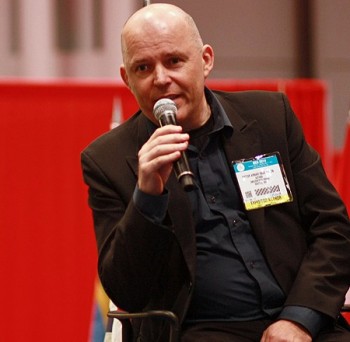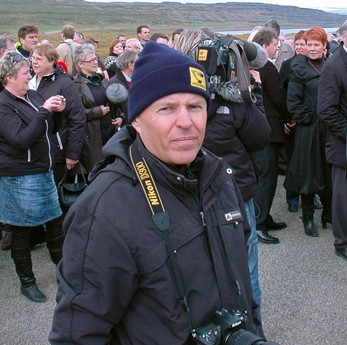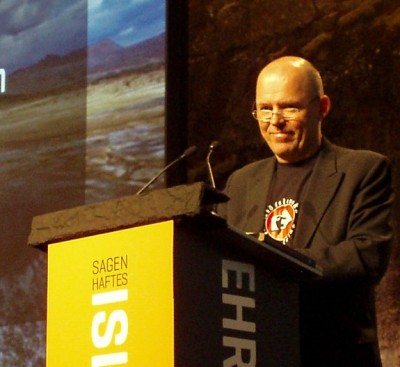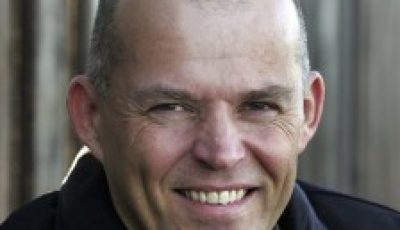

International Thrills: A Conversation With Viktor Arnar Ingolfsson
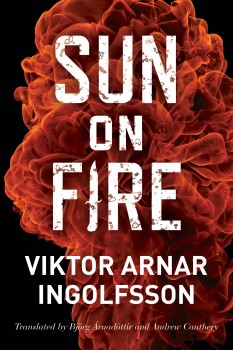 By Layton Green
By Layton Green
Buckle up, folks. Our next foray into international crime fiction takes us to the picturesque, enchanted, and (apparently) murderous world of Iceland, with bestselling author Viktor Arnar Ingolfsson. Viktor has published six mysteries and has been translated into twelve languages, and his short stories have appeared in numerous magazines and collections. His fifth novel, Daybreak, was the basis for the Icelandic TV series “Hunting Men,” and House of Evidence was nominated for the Glass Key prize, an award given by the Crime Writers Association of Scandinavia. The Flatey Enigma was nominated for the same prize.
In the stellar tradition of Nordic crime fiction, Viktor’s work is dark, twisty, and has a very evocative setting. Yet his novels have more than a touch of sly wit and humanity to them, which I found refreshing, and which set him apart from the crowd. You’ll encounter his unique voice in the interview below, and I hope you enjoy delving into his world as much as I did.
Thanks for taking the time to chat, Viktor. We’re thrilled to have you. This is the first time I’ve read an Icelandic crime novel, and I loved the setting. Can you tell us a bit about the area you are from?
Thank you for inviting me. It’s always fun to chat about crime fiction.
I live in Reykjavik, the capital and largest city in Iceland, which is a northern island in the middle of the Atlantic Ocean. According to the island’s geology, the southwest should belong to the North American continent, the rest to Europe. To simplify things the whole island is considered a part of Europe. It has a population of 330,000 and an area of 40,000 square miles, making it the most sparsely populated country in Europe. The language is Icelandic belonging to the Nordic branch of the Germanic languages.
From what I’ve read, Iceland appears to have a very low crime rate. I know your novels have been received very well, but in general, is crime fiction a popular genre in Iceland?
Crime fiction has always been a popular genre with Icelandic readers but until fifteen years ago people would only read foreign authors in translation or in the original languages. Icelandic crime fiction wasn’t considered plausible because of, as you mentioned, the low crime rate. But that was the wrong presumption. Successful crime writers have written series of books that take place in smaller communities than Iceland. For example, the English writer Colin Dexter wrote the Inspector Morse novels that took place in the city of Oxford with a population of 150,000. In his books, he killed many more people than there were actual murders in the city in the same period.
At the turn of the new century things changed in the Icelandic literary scene. Some writers made a serious attempt in the field of crime fiction and suddenly they became very popular at home and abroad. The reason was that they wrote well-crafted stories in the Nordic cime fiction genre. What makes stories in that field special is the social realism, a good plot, and sometimes a very clever humor.
I understand that Iceland has a high population of artists: writers, painters, musicians, poets. Do you find that to be the case? If so, why?
Yes, the creativity in Iceland is unbelievable. We have professional artists in all those fields and also the cinema who are doing very well both at home and internationally. But there are also so many gifted amateurs who are doing great things in their spare time. And everyone has a platform. There are constantly exhibitions, shows, concerts, et cetera.
Why? It is some kind of a self-confidence. In such a small community it is easy to stand up and be noticed. Of course the market for the productivity is smaller but for many creative people money is not the biggest issue. It’s always good to get paid for your effort but if you really have a creative need, a time can always be found outside a day job.
When did you know you wanted to be a writer? What was your first big break?
That wasn’t dramatic at all. My studies in college were in science but I always read a lot. Once when I had pulled an all-nighter reading a simple detective novel I started thinking about the plot and I thought it wasn’t that clever. But how could the author keep me reading the whole night? Maybe this was something I could do myself, I thought. In the next three years I wrote two detective novels that were published, which is a shame because they are no good at all. Fortunately, they went out of print decades ago but the city library in Reykjavik has some copies and I have to go there regularly and hide them in different categories so my readers won’t borrow them. “Viktor has been in again,” the librarians say when they find my first books hidden in the shelves behind some old books on gardening.
But all that was a good experience. I realized I had to learn something about the craft if I wanted to keep on writing. And so I did, not in school, but by reading good literature and books about writing. I also met and got to know other writers and could talk with them about writing.
My first big break was when my fourth novel, The Flatey Enigma, was translated and published in Germany. Since then it has been translated into twelve languages and is still going strong. It is a kind of a classic murder mystery, written in a period, which is practical because that kind of literature has a longer shelf time than stories written in the present.
Which aspect of writing (character, plot, setting, and such) comes easiest to you? Hardest?
My strength in writing a book is the story and the plot. That comes rather easily. To write a beautiful style and language has, in the other hand, always been challenging for me. It helps to read the works of Icelandic authors who have mastered the craft and I do that a lot. It is always possible to learn something. My books are published in many languages and I hope good translators can smooth out the nuances I might have left in the original Icelandic text.
I’d love for you to introduce your work in your own words. What type of reader will love Viktor Ingolfsson’s brand of crime novels?
This is a good one. I guess my readers are mostly people who like different complicated mysteries with no sex and little violence. Once I was asked why there was so little romance in my stories. My wife heard the question and said: “He doesn’t know what the word means.”
Your two main recurring protagonist detectives, Gunnar and Birkir, are very resonant. How did you come up with them?
It was a process when I was writing the first story they appear in. I was going to spend lot of time with my sleuths so I decided to create two guys I would really like to know. Therefore they don’t have big personal issues like many of their fictional Scandinavian colleagues. Both are outsiders in the Icelandic society and it is fun to observe my countrymen through their eyes.
Both are characters I could relate to although they are very different. For example Gunnar is always hungry, as I am and I would be as fat as he is if I wouldn’t exercise like Birkir. I like both of them and could very well spend more time with them in the future. It is always sad when you notice that authors are bored stiff with their protagonists and can’t wait to kill them or marry them off.
There were some issues of diplomatic security and international jurisdiction (as well as plenty of police procedure) at play in Sun on Fire. Do you conduct a lot of research for your work?
Yes I do a lot of research and that is the most enjoyable phase. I read an enormous amount of text. It’s a very good feeling to find one useable fact or sentence after reading hundreds of pages. Also having a conversation with an expert on something and he or she comes up with an angle that I would never have thought of. It’s amazing how very busy individuals are willing to help when you tell them you are writing a book on their professional field. I never sign a publishing contract before I finish the book so there is never a deadline. I can spend all the time I need on the research. The book is ready when it’s ready.
When writing Sun on Fire I was in contact with an American acquaintance who worked with the US State Department and was at that time based in the Reykjavik Embassy. From him I could borrow books on diplomacy, protocol, etiquette, and more. As usual I ended up with too much information and had to throw out many pages of interesting but useless text. That is the only danger when doing research, putting too much of it in the story. When I was finishing my third novel, House of Evidence, more than one hundred pages were cut before the publication.
The beginning of Sun on Fire takes place in the Icelandic embassy in Berlin, Germany. I was able to visit it and ask the employees many questions. But there was one thing I didn’t ask one question about and that was the embassy’s security. Everything I wrote about that was my own imagination.
Your novel Daybreak was the basis for a TV series in Iceland called “Hunting Men.” What was it like to see your work adapted? How did it come about?
That was rather simple. A producer read the story and thought it would do well as a TV series. There had been talks about doing movies from my earlier works and options had been sold so I didn’t think too much about it at that time. I only told the producer I didn’t want to get involved in the adaption. He had a very good screenwriter and I trusted them completely. I never visited the set and didn´t even see any pre-screening. I just sat down with my family four Sundays in a row and watched it on TV like any other viewer. That was fun. The story has a lot of characters and I was sure they would cut half of them but they were all in there. It looked like the Icelandic actors guild annual meeting. Everyone was present. I really liked that experience.
Do you have any advice for new authors?
Write the book you would love to read. You probably heard this before but I think this advice is very important. It’s very hard to please everyone but you can be sure that out there are many readers who have the same taste as you so why not go after them? I like to read slow-paced intelligent mysteries so I try to write the same. I have long ago mastered the slow pace but I’m still working on the intelligence.
Who are some of your favorite crime novelists, both at home and abroad?
My generation of Nordic crime writers grew up reading the Martin Beck series by the Swedish authors Maj Sjöwall and Per Wahlöö. They wrote ten books in ten years, from 1965 to 1975. Since then the Nordic genre has been my favorite. I have also read lots of English mysteries, for example P. D. James. I like her slow-paced stories. It is remarkable how she can keep the reader interested while she describes the interior of a room in four pages. The American Ed McBain was my favorite for many years when I was young. I also like to read mystery writers from many different countries, for example the classics: The Name of the Rose by Umberto Eco (Italy), Smilla’s Sense of Snow by Peter Høeg (Denmark), A Taste for Death by P. D. James (England), Snow Falling on Cedars by David Guterson (USA), The Millennium series by Stieg Larsson (Sweden).
What are you reading right now?
As you can see on the previous list I am a few years behind in my reading. I have been reading crime fiction for many decades and now a crime novel has to get a very good recommendation before I pick it up. Now I read mostly history, memoirs, biographies, and the classics.
How would you like to be remembered as a writer?
Entertaining, I hope.
What can we look forward to in the future from Viktor Arnar Ingolfsson?
I am now working on the third book in the Birkir nd Gunnar series and I hope there will be more.
_________
To learn more about Viktor Arnar Ingolfsson, please visit his website.
- International Thrills: James Wolff - June 30, 2018
- International Thrills: Sara Blaedel - April 30, 2018
- International Thrills: Ramón Díaz Eterovic - November 30, 2017

